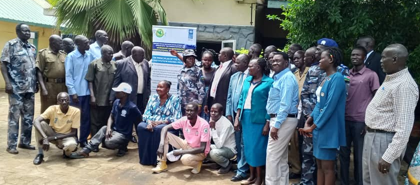At least 75 participants, including officers from the organized forces, chiefs, and representatives from civil society groups, are undergoing training on the Permanent Constitution-making Process Act 2022 in the Eastern Equatoria State capital, Torit.
The training, which commenced on Tuesday, is organized by the Support Peace Initiative Development Organization (SPIDO) with funding from the United Nations Development Program (UNDP) and aims to enhance the understanding of the constitutional-making process.
Speaking during the opening of the training, Counsel Morish John Peter, the SPIDO program officer, stated that the training is part of a newly launched five-year project to support the National Constitutional Review Commission (NCRC) in disseminating the Act to areas in greater Equatoria.
“So, SPIDO, on behalf of the NCRC, is supporting the dissemination of the Act to the people of greater Equatoria. We did the same training in Eastern Equatoria last year, and it is kind of the same project, and we are supposed to reach some people who did not attend the training last year,” he explained. “The only difference we have this time is the incorporation of the women and youth charter, where some input on the permanent constitution was made. We also have an element of civil education and public participation, like this time.”
“This is a historic event because this country has never had a permanent constitution,” John added.
Mathew Ugwak, the state chairperson of SPIDO, described the training as the beginning of the public consultations on the permanent constitution-making process.
“Thank you so much, SPIDO. This is the beginning of public consultations on the permanent constitution-making process,” he said. “This training is very important and, as stated by SPIDO, it is historic because from here it goes to the ground.”
Meanwhile, Mustafa Albino Zakaria, the technical advisor to the Government of Eastern Equatoria State, called on the trainees to actively participate, share ideas, and disseminate the knowledge acquired.
“The constitution is a very important element in our lives because it regulates the relationship among all the stakeholders in the society,” he stated. “It also determines the relationship among the three arms of the government so that we have checks and balances.”
Some of the participants at the training, which concludes on Wednesday, called for the translation of the Act into different languages to help the grassroots populations.
Chapter VI 6.1 of the Revitalized Agreement on the Resolution of the Conflict in the Republic of South Sudan provides for the permanent constitution-making process.
On 26 August 2021, the justice minister presented the Permanent Constitution Making Process Bill to the Council of Ministers. The bill was discussed and approved by the cabinet and was passed by the National Legislature on 21 December 2022.




